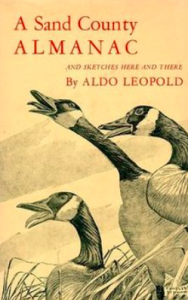A Sand County Almanac, Aldo Leopold

Leopold argues that recreation stems from economic pursuits. He makes a connection between recreation and ethics; perhaps, suggesting that we have commodified the outdoors in our “scramble for unspoiled places” ( p.167). We even have created an award system. For example, taking a photo of a bear, pressing a wildflower, or posting a picture of a pristine nature-scape on Instagram, all of which are all forms of “certification.” They “attest that its owner has been somewhere and done something—that he has exercised skill, persistence, or discrimination in the age-old feat of overcoming, outwitting, or reducing-to possession” (p. 169). While reading this passage, I had to pause, put the book down, with the welcoming of the presence of the wise spirit of Leopold—gently, methodically… and vocally securitizing my normative script of the great outdoors. Perhaps it was the visit of his spirit or a deep internal self-reflection? Nonetheless, we had a good chat.
In reflection, I see how much I romanticize nature and have no qualms, celebrating my time there, with her—Mother Nature with gadgets and many intentions other than just to be and survive in nature. I relish in my time spent with her. I do this by taking pictures of her beautiful conifers or the shimmer of her mountaintops while the sun rises to welcome the day. I usually follow this by sharing the photos of stellar greens, bright yellows, magical blues and contrast colours of wild flowers on social media! With that said, I do wonder how authentic my time in nature is. Is it authentic if I am busy with my camera gadget ? Is it authentic if I looked on trip advisor for tips and tricks regarding how to access her through the fasted and best paved paths? I am not sure if I have come to a right balance.
I think about how precious and beautiful nature is and where we have to travel to, to get a real experience of it. Where do I regularly frolic? And how if I name those nature destinations, I come to the conclusion that many, if not all of them have become extremely overrun with humans. For example, Lynn Valley in the North Shore used to be a place I could retreat for a couple hours on a weekend to escape the city and take a few breaths of fresh, oxygen and pine rich air. Now it is bursting with tourist buses and their cameras. Leopold says, “very intensive management of game or fish lowers the unit value of the trophy by artificializing it” (p. 169). Have we done this with our Beautiful British Columbia tourism? Have we taken away its value by having it overrun with humans?